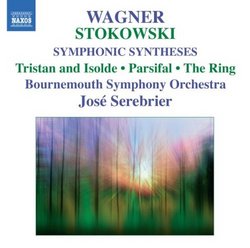An Enjoyable Orchestral Collection of Wagner's Music
Timothy Kearney | Hull, MA United States | 10/05/2007
(4 out of 5 stars)
"As a conductor, Leopold Stokowski not only saw it as an obligation to uphold musical excellence, but also to educate the public in general about music. Perhaps his best known attempts to do so would be his symphonic transcriptions of some of the world's greatest music. This collection includes some of his transcriptions of the operatic music of Richard Wagner.
The strongest of the arrangements in this collection would be the music from TRISTAN UND ISOLDE. He begins with the prelude to Act I and concludes with an arrangement of the familiar "Liebestod." The music sounds like a lush symphonic poem and alone makes the recording worthwhile. There is a similar arrangement of music from Act III of PARSIFAL, again containing some of the work's familiar themes. It does not have quite the impact of the TRISTAN arrangement, though it is respectful of the composer's genius. The arrangements of "The Entry of the Gods into Valhalla" from DAS RHEINGOLD, "The Ride of the Walkures" and the "Fire Music" from DIE WALKURE, are powerful and well performed, though I'll have to admit, I need the vocals, especially in the arrangements from "DIE WALKURE."
Orchestral transcriptions in general are no longer popular, and in some cases, are frowned upon by many musical purists. However, they do play an important role in introducing people to classical music. Most people who enjoy classical music and opera do not begin with Berg, Mahler, and the like. Light classics and transcriptions often capture a listener's attention and whet the appetite for something more. My guess is that Naxos' release of this collection at a reasonable price with an orchestra that clearly enjoys the performance will do exactly what the late Stokowski hoped his arrangements would do: introduce people top great music and hook them for life.
"
Stokowski's and Wagner's 'Lush Life'
J Scott Morrison | Middlebury VT, USA | 10/23/2007
(4 out of 5 stars)
"I'll say this for Stokowski: he had no compunctions about gilding the lily. Wagner's orchestrations for his music dramas was (and still is) among the richest and lushest and most inventive of any in the repertoire. But for his symphonic presentations of Wagner's music Leopold Stokowski added here, subtracted there from the orchestration in order to make it, in his mind, more effective. For instance, to the skittering violins in the Magic Fire Music from 'Die Walküre' he added flutes and piccolos, making it more brilliant, for sure, but it's not exactly Wagner. Granted Stokowski came out of the era in which conductors often tampered with the orchestrations of the composers who came before them. For instance, Mahler re-orchestrated Schumann's symphonies. Still, when one comes to listen to Stokowski's 'symphonic syntheses' of Wagner's music one must to some extent put the sound of Wagner's own orchestration out of one's mind. If one does, one is greet with undoubtedly effective, even thrilling, sound. And that is what happens here in this recreation of several of Stokowski's efforts on Wagner's behalf. José Serebrier was, of course, Stokowski's assistant for a number of years and if I'm not mistaken this is his third recent CD of Stokowski arrangements; there were earlier CDs containing music of Bach, and of Russian music including Stokowski's 1939 orchestration of Mussorgsky's 'Pictures at an Exhibition.'
The big event on the present CD is Stokowski's 'symphonic synthesis' of three parts of 'Tristan und Isolde': the Prélude to Act I, the Liebesnacht, and the Liebestod. By far the longest section is the deliriously ecstatic Liebesnacht, almost twenty-one minutes long. It is a perfect lead-in to the even more ecstatic Liebestod. I cannot fault either Stokowski's arrangement -- here with tasteful assignment of vocal lines to various instruments, primarily Tristan's to the celli, Isolde's to the violins -- and certainly cannot fault the playing of the Bournemouth Symphony, who to my ears keep sounding better and better. (I did find myself wondering if Serebrier had the Bournemouth strings adopt free bowing as Stokowski did with the Philadelphia.) There is direct competition from Stokowski's own recording of the present material and all the rest of his Wagner recordings, available (with some hunting on the Internet) in a 5CD set of performances/transcriptions/arrangements, the 75-to-85-year-old sound beautifully remastered by the inimitable Ward Marston. This set is on the Andante label. Frankly, as wonderful as the Bournemouth is, they don't sound as lush as the old Philadelphia Orchestra, Stokowski's own orchestra for so many years. Still, to be honest the set is in ancient sound. (I grew up with many of these recordings, so they still sound like 'the real thing' to me, pace Maestro Serebrier.)
Still, for those who are not interested in searching out the Wagner/Stokowski recordings, or paying whatever price a 5CD set might command, or are interested only in the orchestral arrangements (as opposed to those plus sung excerpts from the operas on the Andante set), or who are put off by the idea of listening to ancient sound, refurbished though it be, this set then is the one to have. You will not be disappointed.
Scott Morrison"

